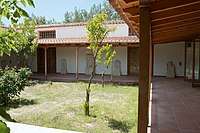Archaeological Museum of Aegina
The Archaeological Museum of Aegina is a museum in Aegina, Greece.

Founded in 1828 by Ioannis Kapodistrias, the first governor of independent Greece, the museum contains a variety of ancient vessels, pottery, ceramics, alabasters, statuettes, inscriptions, coins, weapons and copper vessels.[1] These objects are located in 3 rooms in which are all the exhibits.
One of the artifacts of the museum, an etched carnelian bead, a typical Harappan object, points to ancient trade relations with Mesopotamia and the Indus Valley Civilization.[2]
| Wikimedia Commons has media related to Archaeological museum of Aegina. |
References
- www.aegina.com
- Art of the First Cities: The Third Millennium B.C. from the Mediterranean to the Indus. Metropolitan Museum of Art. 2003. p. 261, Object 266 a and b. ISBN 978-1-58839-043-1.
External links
This article is issued from Wikipedia. The text is licensed under Creative Commons - Attribution - Sharealike. Additional terms may apply for the media files.